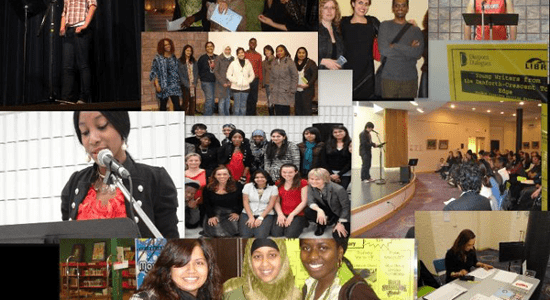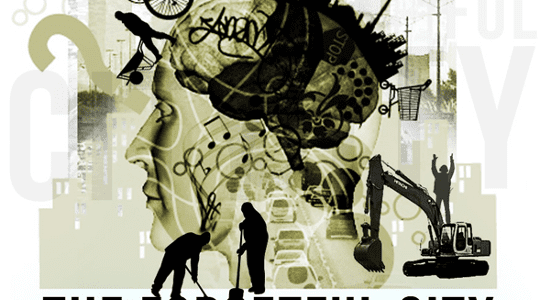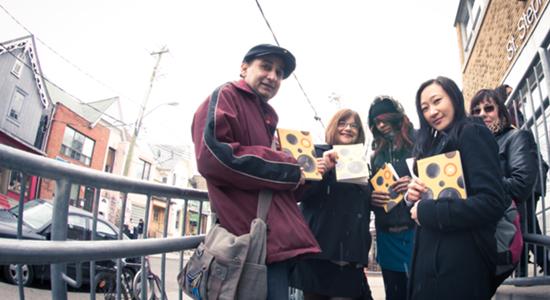Ready to hear the newest set of Toronto’s creative young voices? Then join us at the Bridlewood branch of the Toronto Public Library onTuesday, August 30 at 5:45 p.m. You’ll hear these young writers read from their brand-new fiction and graphic novel work, joined by their mentors, authors Priscila Uppal and Tory Woollcott.
Future City
In partnership with MASS LBP, a trailblazing public consultation firm, Future City brought together a panel of 44 randomly selected Toronto residents, one from each city ward, to explore the implications of growing polarization in Toronto in the fall of 2011. In a series of sessions over the course of a month, the panelists learned about and discussed the three very different cities within Toronto. At the end of the consultation, a series of recommendations compiled by the panelists was published to the public. These recommendations can be found here.
Future City was launched at Scotiabank Nuit Blanche 2011, in an independent project called Public Display of Democracy: The Three Cities Dialogue.
Future City is part of Deeper Dialogues, made possible by the generous support of the Metcalf Foundation’s 50th Anniversary Grants and Citizenship and Immigration Canada through Inter-Action.
Deeper Dialogues has been made possible by the Metcalf Foundation.
Metcalf is 50 years old this year, and to mark this anniversary it has made a small number of special one-time grants designed to celebrate and strengthen our city. Over its history, the Foundation has made sustained contributions to the vitality of our urban life, most recently by focusing its efforts on enhancing the vibrancy of the professional performing arts, addressing issues of poverty, and ensuring the ecological integrity of our natural and working lands. Building on this tradition, and its long and close relationship with Toronto, Metcalf invited a small group of organizations to give their best city-building idea. Metcalf was and is interested in the potential inherent in unleashing ideas not possible under ordinary circumstances. How “city building” was defined was entirely up to them, Metcalf asked only that each organization’s approach reflect their unique mission and contributions to our landscape.
East Scarborough Storefront, a partnership of residents, community groups, and social service agencies in the dynamic, low-income neighbourhood of Kingston Galloway Orton Park, will build an eco-food hub that will act as the foundation for a range of environmental and food-security focused initiatives. With creative leadership from local youth, architects, and designers the Storefront’s building will be transformed resulting in, amongst other things, a commercial grade kitchen, composting systems, new green spaces, and a rainwater management and irrigation infrastructure. The eco-hub will be a model of how linking economic justice, green issues, and food can contribute to community wellbeing, neighbourhood renewal, and a stronger urban fabric.
Theatre Passe Muraille will present an exciting slate of events designed to break down the walls between the theatre and its surrounding neighbourhood. This city-building initiative is grounded in the belief that institutional arts organizations need to change the type of engagements that they have with audiences—going out into the community and building relationships with people who might not attend traditional theatre performances. To this end, over an 18-month period, artists will create and perform work with the general public on the streets and community spaces around the theatre building, on public transit, in taxi cabs, walking and dancing down Queen West, and in many other locales.
Sustain Ontario, a province-wide, cross-sectoral alliance that promotes healthy food and farming, will undertake “Good Food Ideas to Feed a Hungry City,” an initiative aimed at engaging the broader public in a discussion about sustainable, socially just food systems. Using social media strategies and locally based events, Sustain will advance a series of ideas about how Torontonians, in partnership with rural communities, can work together towards a food system that is healthy, ecological, equitable and financially viable.
Deeper Dialogues: Art as Safe Ground? at Luminato
Deeper Dialogues: Art as Safe Ground? at Luminato
Saturday, June 18 at 1:00 PM
Jackman Hall, 317 Dundas Street West
The second event in our Deeper Dialogues series. Deepa Mehta, Anna Porter, and Judith Thompson discuss the vital role of storytelling in society. Does storytelling provide a safe space in which to tackle challenging subjects? What conditions are required for such a space to exist—and how successfully are those conditions met in Canada? Moderated by Steve Paikin.
Tickets $20, visit luminato.com.
Deeper Dialogues: The Forgetful City at Doors Open Toronto
May 28 & 29, 10 am—5 pm
RC Harris Water Treatment Plant, 2701 Queen Street East
The first event in our brand-new arts and ideas series, Deeper Dialogues, kicks off this weekend! Join us for The Forgetful City—an interactive installation created by Yvette Nolan, Gein Wong and Donna-Michelle St Bernard, plus a panel discussion on Sunday that explores what as a society we collective decide to forget and what we choose to hold on to through memory and its embodiment in our physical city.
TOK: Writing the New Toronto, Book 6 Reading
May 19, 6:00 p.m.
Ben McNally Books, 366 Bay Street
Drop in to Ben McNally Books after a long day at the office for a nibble and a refreshing sampling of Toronto’s best and brightest writers. David Layton, Martin Mordecai, Alicia Elliott and Lynda Allison read from their Toronto-set stories in the latest installment of our annual anthology, TOK: Writing the New Toronto. Hosted by Antanas Sileika.
Launch of TOK: Writing the New Toronto, Book 6
April 20, 6:00 p.m.
Gladstone Hotel, 1214 Queen Street West
Diaspora Dialogues launches the sixth book in its TOK: Writing the New Toronto anthology series, with readings and a lively panel discussion from emerging and established writers, including Rishma Dunlop, David Layton, Karen Connelly and more.




